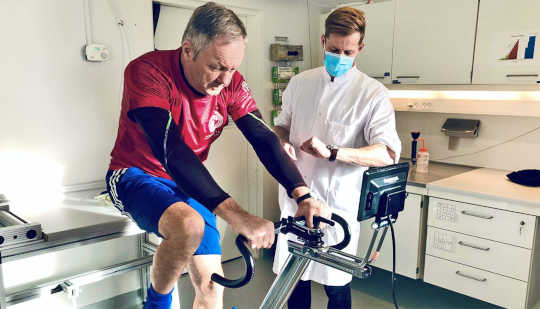
Even though our fatty tissue loses important function with age, a high volume of exercise can have a significant impact for the better, according to a new study.
How well does your fat function? It isn’t a question that one gets asked very often.
Nonetheless, research in recent years suggests that the function of our fat tissue, or adipose tissue, is central to why our bodies decay with age, and strongly linked to human diseases like diabetes 2, cancer, and obesity often develop and fat cells undergo functional changes as we get older.
Overall health is therefore not just influenced by the amount of fat we bear, but about how well our fat tissue functions.
“Overall health is closely linked with how well our fat tissue functions. In the past, we regarded fat as an energy depot. In fact, fat is an organ that interacts with other organs and can optimize metabolic function. Among other things, fat tissue releases substances that affect muscle and brain metabolism when we feel hungry and much more. So, it’s important that fat tissue works the way it should,” explains Anders Gudiksen, an assistant professor in the University of Copenhagen’s biology department.
Gudiksen and a group of colleagues looked at the role of age and physical training in maintaining fat tissue function. Specifically, they studied mitochondria, the tiny power plants within fat cells. Mitochondria convert calories from food to supply cells with energy. To maintain the life processes within cells, they need to function optimally.
The researchers compared mitochondrial performance across a range of young and older untrained, moderately trained, and highly exercise trained Danish men. The results demonstrate that the ability of mitochondria to respire—i.e., produce energy—decreases with age, regardless of how much a person exercises.
However, Anders Gudiksen explains, “Although mitochondrial function decreases with age, we can see that a high level of lifelong exercise exerts a powerful compensatory effect. In the group of well-trained older men, fat cells are able to respire more than twice as much as in untrained older men.”
Just as a car engine produces waste when converting chemical to usable energy, so do mitochondria. Mitochondrial waste comes in the form of oxygen free radicals, known as ROS (Reactive Oxygen Species). ROS that isn’t eliminated damages cells and the current theory is that elevated ROS can lead to a wide range of diseases including cancer, diabetes, cardiovascular disease and Alzheimer’s. Therefore, the regulation of ROS is important.
“The group of older people who train most form less ROS and maintain functionality to eliminate it. Indeed, their mitochondria are better at managing waste produced in fat cells, which results in less damage. Therefore, exercise has a large effect on maintaining the health of fat tissue, and thereby probably keeping certain diseases at bay as well,” says Gudiksen.
The researchers can also see that the older participants who exercised most throughout life have more mitochondria, allowing for more respiration and, among other things, an ability to release more of the fat-related hormones important for the body’s energy balance.
“Our results show that you can actually train your fat tissue to a very high degree—but that you needn’t cycle 200km [124.274 miles] a week to achieve a positive effect. What you shouldn’t do, is do nothing at all,” concludes Gudiksen, who hopes that the research world will focus more on what people can do to maintain the health of their fatty tissue.
The next step for the researchers will be to investigate where exactly cellular damage occurs when people don’t exercise and what impact this has on the body as a whole over time. Concurrently, the researchers are exploring ways to pharmacologically manipulate the mechanism in the mitochondria that converts calories into heat instead of depositing calories as fat, in turn lowering the production of the harmful oxygen radicals.
Study subjects were 20-32-year-old untrained men and 62-73-year-old men, who throughout their lives were either untrained, moderately trained, or highly trained. All men were healthy, unmedicated, and had a BMI below 30.
The researchers suggest that the study estimates are conservative as the participants are unlikely to represent the population as a whole, where a higher proportion of people are probably in poorer physical shape and suffer from health problems than the participants recruited. None of the study’s older participants took prescription medication, whereas a large proportion of the population in this age group otherwise does.
About the Authors
The paper about the study appears in The Journals of Gerontology.
Source: University of Copenhagen
Books on Exercise from Amazon's Best Sellers list
The Four-Pack Revolution: How You Can Aim Lower, Cheat on Your Diet, and Still Lose Weight and Keep It Off
by Chael Sonnen and Ryan Parsons
The Four-Pack Revolution presents a total-life approach for attaining health and fitness goals without the hard work and suffering.
Click for more info or to order
Bigger Leaner Stronger: The Simple Science of Building the Ultimate Male Body
by Michael Matthews
If you want to build muscle, lose fat, and look great as quickly as possible without steroids, good genetics, or wasting ridiculous amounts of time in the gym and money on supplements, then you want to read this book.
Click for more info or to order
The Women's Health Big Book of Exercises: Four Weeks to a Leaner, Sexier, Healthier You!
by Adam Campbell
The Women's Health Big Book of Exercises is the essential workout guide for anyone who wants a better body. As the most comprehensive collection of exercises ever created, this book is a body-shaping power tool for both beginners and longtime fitness buffs alike.
Click for more info or to order
Bodyweight Strength Training Anatomy
by Bret Contreras
In Bodyweight Strength Training Anatomy, author and renowned trainer Bret Contreras has created the authoritative resource for increasing total-body strength without the need for free weights, fitness machines, or even a gym.
Click for more info or to order
The Men's Health Big Book of Exercises: Four Weeks to a Leaner, Stronger, More Muscular You!
by Adam Campbell
The Men's Health Big Book of Exercises is the essential workout guide for anyone who wants a better body. As the most comprehensive collection of exercises ever created, this book is a body-shaping power tool for both beginners and longtime fitness buffs alike.


























